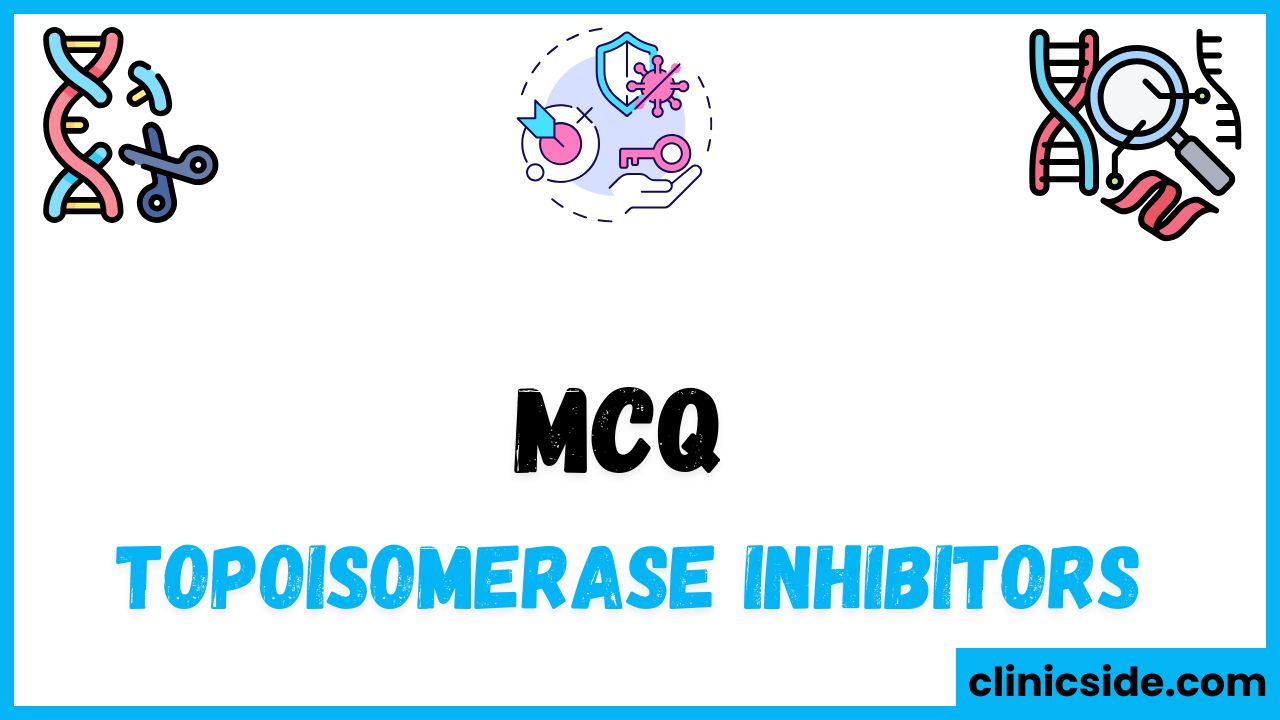Quiz
Available options: 1 to 20
Overview of Topoisomerase Inhibitors and Their Applications in Cancer Treatment
Mechanism of Action of Topoisomerase Inhibitors
Topoisomerase inhibitors block essential DNA repair mechanisms by interfering with the re-ligation of DNA strands. This disruption prevents proper DNA replication, which is crucial for cell survival and division. These drugs can specifically target topoisomerase I or II, both of which play vital roles in managing DNA stress during cell division.
Topoisomerase I Inhibitors
Irinotecan is a widely used topoisomerase I inhibitor, particularly effective in treating colorectal cancer. These inhibitors prevent the rejoining of DNA strands after they have been cut, leading to the accumulation of DNA damage and eventual cell death. Another notable topoisomerase I inhibitor is topotecan, which is commonly used in ovarian cancer treatments.
Topoisomerase II Inhibitors
Etoposide, derived from the mandrake plant, is an example of a topoisomerase II inhibitor. This class of drugs interferes with the DNA repair process by inhibiting topoisomerase II. Etoposide is used to treat a variety of cancers, including small-cell lung cancer and testicular cancer, by preventing the enzyme from repairing DNA breaks in rapidly dividing cancer cells.
Anthracyclines and Their Action
Anthracyclines, such as doxorubicin, work by inhibiting topoisomerase II and also by intercalating into DNA. This interference generates free radicals that further damage the DNA, making these drugs highly effective against cancers like breast cancer and leukemia. However, they come with significant toxicities, including damage to the heart.
Dose-Limiting Toxicities
The therapeutic use of chemotherapy agents is often limited by their side effects. For example, irinotecan is most known for causing diarrhea, while topotecan’s major side effect is myelosuppression, a condition that leads to reduced blood cell production. These toxicities must be carefully managed during treatment to ensure the patient’s well-being.
Cardiotoxicity in Doxorubicin
Doxorubicin is a well-known chemotherapy drug that can cause cardiotoxicity, leading to potential heart failure. To mitigate this risk, drugs like dexrazoxane are used as protective agents to prevent cardiac damage during treatment. These preventive measures are crucial to ensure the safety of patients undergoing chemotherapy with anthracyclines.
Applications in Colorectal and Ovarian Cancers
Irinotecan is highly effective for treating colorectal cancer, while topotecan is predominantly used for ovarian cancer. Both belong to the group of topoisomerase I inhibitors and serve as important options in chemotherapy regimens tailored for these types of cancer.
Secondary Effects and Leukemia Risk
Etoposide, among other chemotherapy drugs, carries a risk of causing secondary acute myeloid leukemia (AML), a form of cancer that can develop after chemotherapy treatment. This side effect is an important consideration when prescribing etoposide, especially for long-term cancer management.
Topoisomerase II Inhibitors in Testicular Cancer
Etoposide is also an essential drug in treating testicular cancer. Like its other applications, it works by inhibiting topoisomerase II, preventing the repair of DNA and leading to cancer cell death. Its role in treating testicular cancer highlights its broad utility in oncology.
Bleomycin’s Unique Toxicities
Bleomycin is distinctive among chemotherapy drugs due to its potential to cause pulmonary fibrosis, a severe lung condition. Unlike many other cancer treatments, bleomycin does not usually cause myelosuppression or cardiotoxicity, but its lung toxicity requires close monitoring and careful management.
Conclusion
This summary highlights the diverse roles of topoisomerase inhibitors and related chemotherapy drugs in cancer treatment. Understanding how these drugs work, along with their potential side effects, is essential for oncologists to provide the best care possible. While these drugs are vital in fighting various cancers, careful management of their toxicities is necessary to optimize treatment outcomes and minimize harm to patients.





